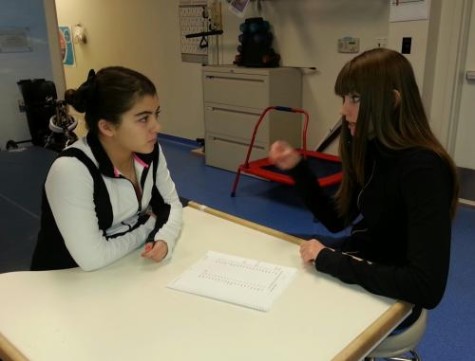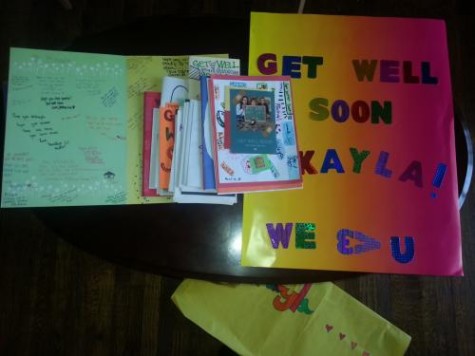Sixth grader suffers severe head injury

Sloan Creek Intermediate School student, Mikayla Slatten, recently experienced a severe head injury, and is now undergoing weeks of rehab.
February 24, 2014
Mikayla Slatten is a fun, energetic, and beautiful sixth-grade student at Sloan Creek Intermediate School. She participated in sports, sings in the choir, and even plays for the orchestra. Her life seemed totally normal and careless until a month ago on Sunday, January 26 when her life took a drastic turn.
“She was riding a ripstick down the street outside of our house,” stepdad Brian Holmes said. “We believe she hit a small rock and went flying and landed on the cement face down basically where the left corner of your glasses would be and there’s three bone plates held by cartilage there and the surgeons believe that one of those plates moved back and nicked an artery on the surface of her brain causing subdural bleeding and a subdural hematoma so that was causing the centerline shift of her brain which basically means it was off center by about 10 millimeters.”
Though this injury was very severe, there was a quick reaction from emergency response teams, and Mikayla was undergoing treatment within hours.
“The Lucas Fire Department sent an ambulance here in four minutes and got her loaded up and she was at Children’s Medical Center of Dallas inside of an hour and they had her in surgery in three and a half hours,” Holmes said.
After a successful brain operation, the doctors and surgeons still had some major concerns and knew that there was a good chance that Slatten would never speak again.
“Our biggest concern was that when the accident happened, the portion of the brain where the artery ruptured is where most people have their speech centered,” Holmes said. “Since she was left handed, there was a thirty percent chance that it was on the other side, but nobody would know until she woke up and they took the breathing tube out, and find out if she could talk or even understand speech.”
Fortunately, Slatten was in the lucky 30 percent, and was blessed with the ability to once again speak.
“The Monday after the surgery, when they took the tube out and she woke up, and said ‘My throat is so dry,” it was that moment that was such a gigantic relief,” Holmes said. “Just seeing and knowing that it was still she was still there and it was still her 100 percent as she continued to go though recovery was just one relief after another.”
The whole experience seemed to be a blur for Slatten. Even after the actual accident, things seemed unclear.

“When you are in the hospital you don’t really realize it,” Slatten said. “When I was going in the surgery and stuff since I had the memory loss I didn’t really know it.”
After brain surgery, Slatten remained in the hospital for five more days. While there, she underwent CT scans, rounds of therapists, and constant monitoring by multiple doctors. During this time, her family stayed right by her side, constantly supporting her through everything.
“While she was in the hospital, someone needed to be there almost all the time, so I would be down there first thing in the morning and spend the day with her and send her mom home to sleep, then her mom would come back to the hospital in the evening and I would go home and sleep,” Holmes said.
For Slatten’s family, constantly being up at the hospital became very emotionally straining, making it difficult to stay positive all the time.
“It was very hard for me [to watch her go through this],” Holmes said. “As the man, as the step-dad and everything, I felt like I had to be strong for everybody. I also didn’t want Mikayla to wake up and see me worried. She needed to see in my face the unwavering certainty that she was going to be 100 percent fine, which, thanks God, turned out to be the case, but when she woke up and she was swollen, and she had a zipper on her head, tubes in her throat, and she’s scared because she doesn’t know where she is, she can’t look at us and see us panicking. I also had to stay strong for Candy, my wife.”

Slatten also had support coming from friends and administration at school, making the process much easier for her.
“I had a lot of support friends and family and our school counselor came by and dropped off some cards that people made,” Slatten said. “There’s actually a lot of card that people made, so everybody has been really supportive.”
After being released from the hospital, Slatten began the long, time-consuming, challenging process of recovery.
“The recovery is really variable,” Holmes said. “The way the doctors explained it is that everyones brain heals differently. The steps are the same, the lengths that those steps take and how much time someone has to spend on one step is completely variable based on the person. It looks like she will make a full recovery.”
Mikayla’s currently undergoing weeks of rehab, and seems to be doing well with a return to school scheduled for March 3.
“She has been doing wonderful in rehab and continues to improve,” mom Candy Slatten said.
It seems that Mikayla will make an almost full recovery and be able to return to a normal, active life. While she will not be able to play contact sports again, she will still be fully functional. Through all the pain and sadness that Slatten and her family have gone through, they look at the positive side of things and consider it a learning experience.
“Probably the biggest thing I have learned is truly the importance of helmets,” Holmes said. “When I was a child, I left in the morning on my bike, and be home before dark. I fell a thousand times, hit my head hundreds of times. So my perspective as a parent was always that helmets were what overprotective parents did and that they were silly but obviously that whole attitude changed 180 degrees in three seconds. Nobody thinks that your child is going to go from riding a skateboard in the street on a beautiful Sunday to brain surgery three and a half hours
later so I have been telling everyone, make your kids wear helmets, don’t take no for an answer, don’t make it an option. It needs to happen. It’s been a big mind change for me.”



